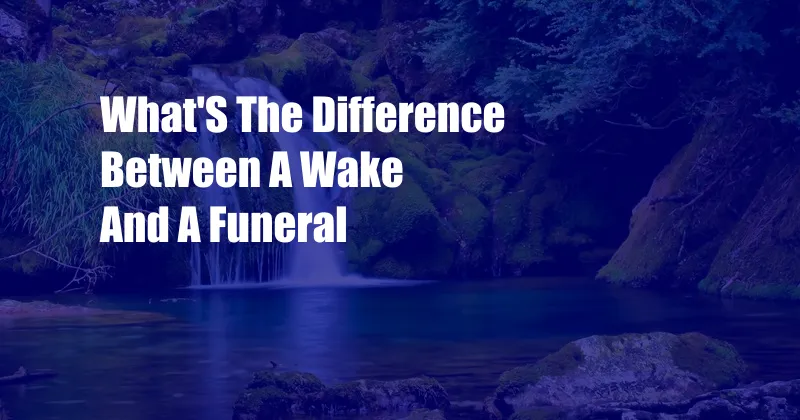
The Profound Distinction: A Wake and a Funeral
In the tapestry of life, moments of mourning and remembrance weave their own somber threads. Amidst the profound emotions stirred by the loss of a loved one, we often encounter the terms “wake” and “funeral,” two distinct yet interconnected rituals that serve as poignant expressions of grief and honor.
Before delving into their differences, it is essential to grasp the shared purpose that binds them: to facilitate the process of saying goodbye and to celebrate the life that has passed. Both offer a space for family, friends, and the community to gather, to share memories, and to find solace in their shared loss.
The Wake
A Prelude to the Farewell
A wake, also known as a viewing or visitation, typically takes place in the evening before the funeral service. It is an informal gathering where loved ones gather to pay their last respects to the deceased and offer support to the grieving family. The body of the deceased is usually present, either in an open or closed casket.
During a wake, mourners may engage in various activities, such as sharing stories, reminiscing, and offering words of comfort. It provides an opportunity for the community to come together, to remember the individual and their life, and to offer condolences to the family.
The Funeral
A Solemn Farewell
A funeral, on the other hand, is a more formal and structured ceremony that typically takes place in a church, funeral home, or other designated location. It is the final farewell to the deceased and often includes religious or spiritual rituals, readings, eulogies, and music.
The funeral service provides a space for mourners to come together to honor the life of the deceased, to celebrate their memory, and to say their final goodbyes. It is a time for reflection, remembrance, and the expression of grief. Following the service, the body is typically laid to rest in a cemetery or crematorium.
Distinctive Differences
While both wakes and funerals serve as expressions of grief and remembrance, they differ in several key aspects:
- Timing: A wake usually takes place the evening before the funeral, while the funeral is held the following day.
- Formality: Wakes are generally more informal gatherings, while funerals follow a more structured ceremony.
- Location: Wakes are typically held in a funeral home or other designated location, while funerals may take place in a church, funeral home, or other religious or spiritual setting.
- Attendees: Wakes are often open to all friends and family members, while funerals may have a more limited guest list.
Understanding these differences can help individuals make informed decisions regarding their participation in these important events.
Expert Advice: A Guiding Hand
For those navigating the complexities of grief and loss, seeking guidance from experts can provide invaluable support:
- Funeral Directors: Funeral directors can assist with all aspects of funeral planning, from selecting the location and arranging the service to providing bereavement support.
- Grief Counselors: Grief counselors offer professional guidance and support to individuals navigating the emotional challenges of loss.
- Online Resources: Numerous online resources, such as support groups and websites, provide information, resources, and a platform for connecting with others who have experienced loss.
By seeking guidance and support, mourners can navigate the challenging path of bereavement with greater ease and understanding.
FAQs: Unraveling Common Queries
To address common misconceptions and provide further clarity, here are answers to frequently asked questions about wakes and funerals:
- Q: Are wakes obligatory?
A: No, wakes are not obligatory. Attendance is optional and based on personal preference.
- Q: What is the significance of open caskets?
A: Open caskets provide an opportunity for mourners to view the deceased one last time and to say goodbye in person.
- Q: Can I attend a funeral without attending the wake?
A: Yes, it is possible to attend a funeral without attending the wake. However, it is considered more respectful to attend both events if possible.
- Q: What should I wear to a wake or funeral?
A: Dress respectfully in dark or neutral colors. Avoid wearing overly casual or revealing clothing.
- Q: Can I bring a gift to a wake or funeral?
A: Flowers or a sympathy card are appropriate gifts to bring to a wake or funeral.
Conclusion: A Remembrance that Endures
The distinction between a wake and a funeral lies in their unique characteristics, each serving a pivotal role in the grieving process. By understanding these differences, mourners can participate in these events with greater purpose and meaning.
As we traverse the inevitable cycle of life, may we find comfort and strength in the shared rituals of remembrance that honor those we have lost and celebrate the memories that endure.
Is this topic interesting to you?
Please let us know if you found this article informative and engaging. Your feedback helps us create better content for our readers.